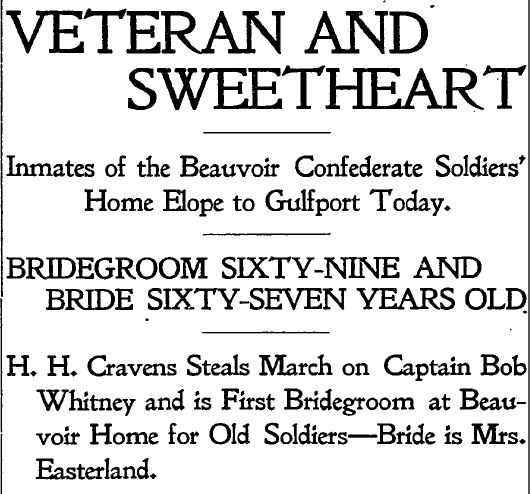On December 22, 1909, Henry H. Craven and Mary Easterland ran away from home and eloped. The couple probably had no idea just how widespread knowledge of their “secret” plot had become—in fact, the Biloxi Daily Herald printed the news of their nuptials even before Reverend J. L. Finley finished conducting their wedding.

“The wedding to be has been the subject of a great deal of interested and sympathetic comment,” the paper explained, “but the elopement of the aged lovers, who are young in spirit if old in years, has aroused a whirlwind of surprise and interest whenever known.”
The soon-to-be Mr. and Mrs. Craven were no ordinary bride and groom; they were residents of the Beauvoir Veterans Home. Henry enlisted in the 42nd Mississippi Infantry in 1862, and served with the regiment until he was wounded and captured during Pickett’s Charge at the Battle of Gettysburg. After farming in Yalobusha, Jasper, and Leake Counties, Henry and his previous wife, Maggie, moved into Beauvoir on January 1, 1908. Sadly, Maggie died shortly afterwards of heart disease.
Mary Easterland was a native of Jones County, Mississippi, and she moved into the old soldier’s home on a widow’s pension on July 27, 1908. It was there that she met the recently widowed Henry Craven.
According to the home’s superintendent, John K. Mosby, the “Romeo and Juliet affair [had] been brewing for some months.” After learning of his wards’ plans from Reverend Finley, Mosby quietly converted a hospital room into a room for the newlyweds. “I am going to take care of my children to the best of my ability,” he told the Daily Herald, “so when I thought of this room I had it prepared for the returning lovers.”
The Cravens were only the first of several marriages between residents at Beauvoir. In fact, their “secret” nuptials preempted the wedding of Captain Robert Whitley and his fiance that had been scheduled on Christmas Day.
Henry and Mary Craven lived happily together at Beauvoir for the next five years, organizing charity events together and donating fifty dollars to erect a memorial to the women of the Confederacy. Henry died in 1914 and was survived by his wife.
Lead author: Allan Branstiter, Southern Miss history doctoral candidate. Research conducted by Southern Miss student Perre Carter.
